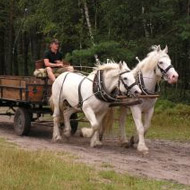World Horse Welfare hosts 'value of horses' Conference

Horses are valued as working horses, sport competitors and as much loved family pets.
World Horse Welfare's 2014 Conference took place on Thursday, November 13 at the Royal Geographical Society. This year the charity considered the thought provoking question "what is the value of horses?"
The Conference was opened by HRH The Princess Royal who underlined the many different ways in which horses are valued in today's society - as sport competitors, as working horses, as much loved family pets, and even how they are valued in the slaughter trade.
A varied range of influential presenters joined World Horse Welfare for the event, including Roger Scruton, writer and philosopher on the purpose and value of horses, Soenke Lauterbach, secretary general of the German Equestrian Foundation, and professor Cathy McGowan from the School of Veterinary Science at the University of Liverpool. Each speaker on the day spoke about the many other interpretations of the value of horses - from the value of the horse in sport and leisure, to the functional value of the working horse to impoverished communities overseas.
The Conference was also joined by Royal Marine Veteran, Jason Hare, who stood to explain what a horse's value meant to him. Speaking to a packed audience of over 400, which included leading figures from sport, the media and veterinary medicine, Jason praised the work of Horseback UK - a charity which helped him back to recovery after suffering serious physical injuries whilst serving as a Royal Marine.
Jason said: "I found working with horses extremely beneficial. It's hard to be patient when you're a patient, but working with these animals relaxed me and taught me perseverance. You can't bully boy horses - they'll just kick you or run away but you can't be too passive either or they won't listen. You have to find a balance, like everything in life. In the Royal Marines we say: you have to improvise adapt and overcome - it's the same principle in the role; it might take weeks, months or even a year but this gave me my mobility back - and with dignity."
Roly Owers, chief executive of World Horse Welfare closed the conference, saying that he had been "truly amazed" by the many different ways horses are valued.
To watch each of the individual sections of the Conference visit www.worldhorsewelfare.org.



 The veterinary mental health charity Vetlife is inviting the veterinary community to join it for a sponsored cold-water dip.
The veterinary mental health charity Vetlife is inviting the veterinary community to join it for a sponsored cold-water dip.